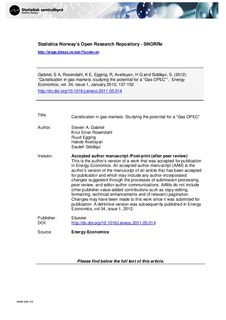Cartelization in gas markets: Studying the potential for a “Gas OPEC”
Journal article, Peer reviewed
Permanent lenke
http://hdl.handle.net/11250/177746Utgivelsesdato
2012Metadata
Vis full innførselSamlinger
Originalversjon
Energy Economics, Volume 34, Issue 1, January 2012, Pages 137–152Sammendrag
Natural gas is increasingly important as a fuel for electric power generation as well as other uses due to its environmental advantage over other fossil fuels. Using the World Gas Model, a large-scale energy equilibrium system based on a complementarity formulation, this paper analyzes possible future gas cartels and their effects on gas markets in a number of regions across the world. In addition, scenarios related to lower transport costs and decreased unconventional gas supply in the United States are considered.
Beskrivelse
This is the accepted author manuscript . It is the author’s version of the manuscript of an article that has been accepted for publication and which may include any author-incorporated changes suggested through the processes of submission processing, peer review, and editor-author communications.
Utgiver
ElsevierTidsskrift
Energy EconomicsBeslektede innførsler
Viser innførsler beslektet ved tittel, forfatter og emneord.
-
The impacts of alternative policy instruments on environmental performance. A firm level study of temporary and persistent effects
Bye, Brita; Klemetsen, Marit Elisabeth (Discussion papers;788, Working paper, 2014-10)We study the effects of various environmental regulations on environmental performance measured as emission intensity. Moreover, we aim to test whether any such effects are persistent or only temporary. Conventional theory ... -
The welfare effects of carbon policies: grandfathered quotas versus differentiated taxes
Bye, Brita; Nyborg, Karine (Discussion Papers;No. 261, Working paper, 1999)Recently, it has been demonstrated that pre-existing distortionary taxes can substantially increase the costs of market-based instruments which do not raise revenue, such as non-auctioned emissions quotas. Revenue-raising ... -
Labour market rigidities and environmental tax reforms : welfare effects of different regimes
Bye, Brita (Discussion Papers;No. 242, Working paper, 1998)The working of the labour market is important for the total welfare effects of tax reforms. This paper analyses, by using a computable general equilibrium model for the Norwegian economy, how different assumptions about ...
